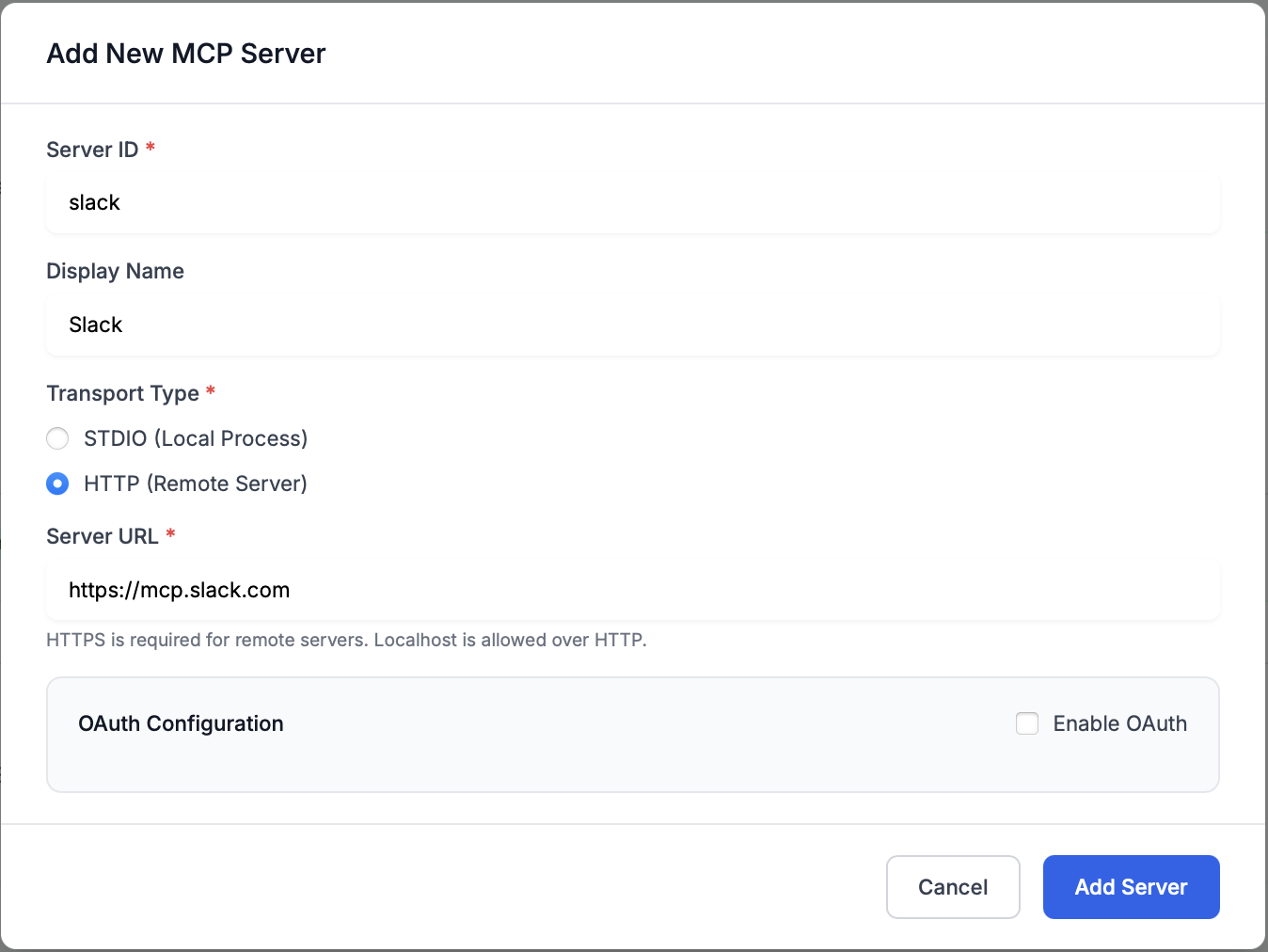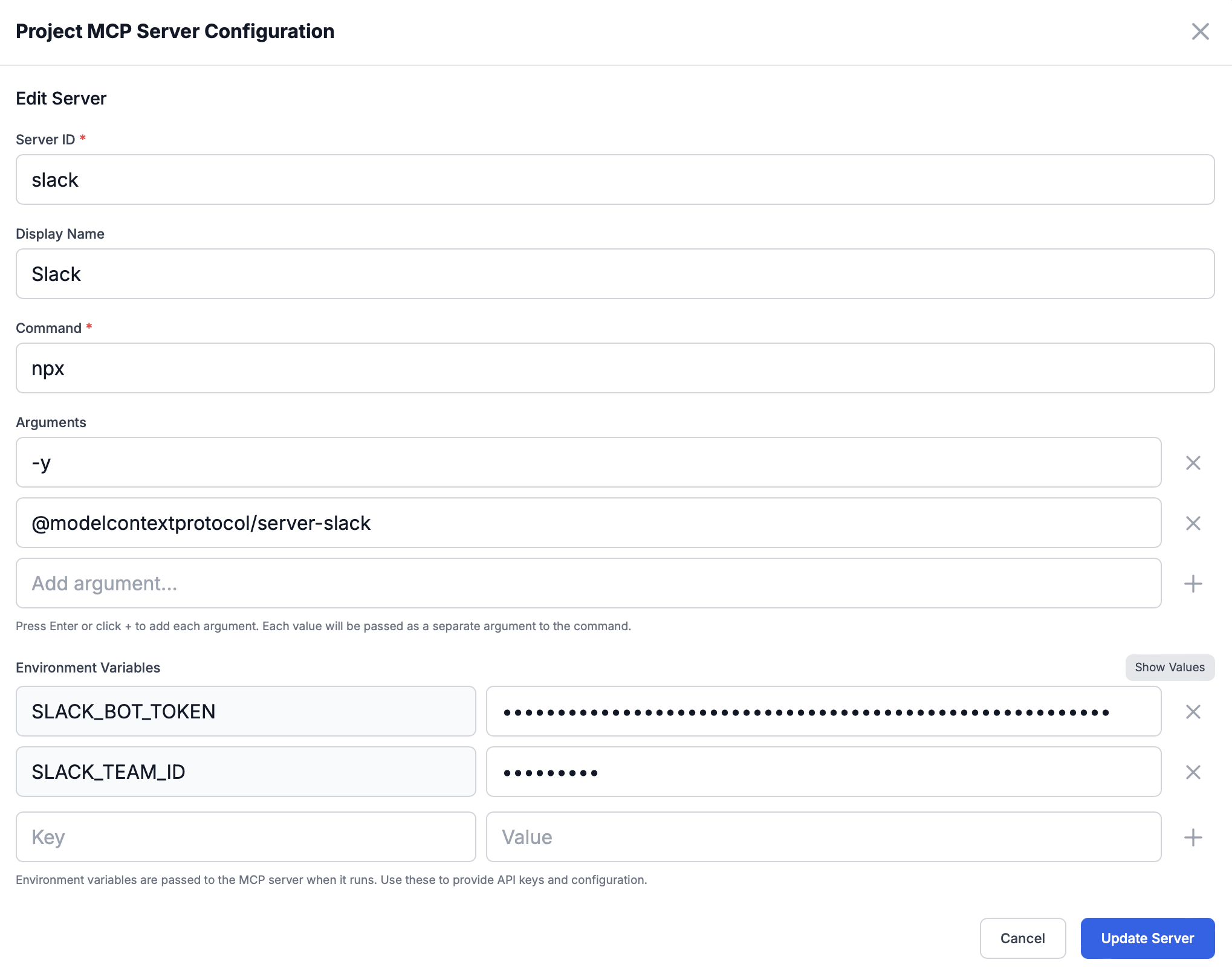Model Context Protocol (MCP) Servers
Extend BB's capabilities by connecting to a wide range of external tools and services through Model Context Protocol servers.
What is MCP?
The Model Context Protocol (MCP) is an open standard that allows BB to securely connect with external tools, systems, and data sources through standardized servers. With MCP support, BB can:
- Access external APIs and services
- Connect to databases and data platforms
- Interact with specific tools like GitHub, Slack, or Google Drive
- Access specialized functionality for different professional areas of expertise
- Perform tasks that require secure access to external systems
Key Benefits:
- Extends BB's capabilities beyond its built-in functionality
- Provides secure, controlled access to external tools
- Supports hundreds of different integrations through community servers
- Enables advanced workflows that span multiple systems
- Maintained by a growing community of developers and organizations
Local vs Remote MCP Servers
BB supports two types of MCP server connections, each suited to different use cases:
Local MCP Servers
Run as processes on your machine, connecting via STDIO (standard input/output).
Best for:
- Accessing local files and databases
- Running custom tools and scripts
- Development and testing
- Maximum privacy and control
Remote MCP Servers
Hosted services accessed via HTTP/HTTPS, often with OAuth authentication.
Best for:
- Connecting to cloud services (Slack, Google Drive, etc.)
- Accessing company systems and APIs
- No local installation required
- Secure OAuth-based authentication
Pro Tip: Use local servers for file system access and development tools, and remote servers for cloud services and team integrations. You can use both types simultaneously in the same project.
Remote MCP Servers
Remote MCP servers eliminate the need for local installation—connect to hosted services with just a URL. Perfect for integrating cloud services, company systems, and specialized tools directly into your BB workflow.
Why Use Remote MCP Servers?
- Zero Installation: No software to download or manage—just add the server URL
- Secure OAuth Access: Connect to private services (Slack workspaces, company systems, research databases) with one-click authentication
- Team Context: Access shared team resources and collaboration tools without leaving BB
- Growing Ecosystem: Hundreds of servers available for knowledge work, research, and business systems
Finding Remote MCP Servers
Browse these directories to discover servers for your workflow:
- mcpservers.org - Curated collection of production-ready servers
- mcp.so - Community-driven server directory
- mcpserverdirectory.org - Comprehensive searchable catalog
Common Use Cases:
- Team collaboration: Pull Slack threads or meeting notes into your project context
- Research workflows: Access academic databases or specialized search engines
- Business systems: Connect to CRMs, HR platforms, or project trackers
- Calendar intelligence: Coordinate schedules without switching apps
Available MCP Servers
BB supports a wide range of MCP servers across different categories:
File and Data Access
- Filesystem: Access and manage files with configurable permissions
- Google Drive: Search and access files stored in Google Drive
- Database Connectors: Connect to PostgreSQL, MySQL, SQLite, MongoDB, and other databases
- Vector Databases: Integrate with Chroma, Qdrant, Pinecone for vector search
Development and Collaboration
- Git: Manage local Git repositories
- GitHub/GitLab: Access repositories, issues, PRs, and other platform features
- Slack: Read from and post to Slack channels
- Docker: Manage Docker containers and images
- Kubernetes: Interact with Kubernetes clusters
Research and Content
- Web Search: Search the web using various search engines
- Fetch: Retrieve and process web content
- Memory: Store and retrieve information across conversations
- EverArt: Generate images using various AI models
Analysis and Visualization
- Visualization Tools: Create charts, graphs, and visualizations
- Data Processing: Handle and transform data in various formats
- Time Series Analysis: Work with time-based data
Growing Ecosystem: The MCP ecosystem continues to grow with new servers being added regularly. For the most up-to-date list of available servers, visit the MCP GitHub repository.
Configuring MCP Servers
BB allows you to configure MCP servers at both the global and project levels:
Global MCP Configuration
Global configurations apply to all projects unless overridden by project-specific settings. You can access MCP server settings through BB'sGlobal Settings interface:
- Go to BB Settings in the main application
- Select the "MCP Servers" tab
- Click "Configure Servers" to add or modify server configurations
- Each server can be configured with specific parameters

Project-Level MCP Configuration
Project-specific configurations apply only to the selected project:
- Open your project in BB
- Go to Project Settings
- Select the "MCP Servers" tab
- Configure servers specific to this project

Server Configuration Details
Each MCP server has specific configuration options depending on its transport type:
Transport Type
Choose how BB connects to the MCP server:
- STDIO (Local Process): Runs the server as a local process on your machine. Requires the server software to be installed locally.
- HTTP (Remote Server): Connects to a hosted MCP server via HTTPS. No local installation required—just provide the server URL.
Configuration Fields
- Server ID: Unique identifier for the server (e.g., "slack", "github-work")
- Display Name: Human-readable name shown in the UI
- Command (STDIO only): The command to run the local server process
- Arguments (STDIO only): Command-line arguments passed to the server
- Server URL (HTTP only): The HTTPS endpoint for the remote server (e.g., "https://mcp.slack.com")
- Environment Variables: Key-value pairs providing configuration or secrets (both transport types)
OAuth Authentication
Remote MCP servers often require OAuth for secure access to private services. BB supports two OAuth configuration methods:
Automatic OAuth (Recommended)
Simply check "Enable OAuth" when adding a remote server. BB automatically discovers the authentication requirements from the server and guides you through the secure login process:
- BB queries the MCP server for its OAuth configuration
- A secure login window opens from the third-party provider (similar to "Sign in with Google")
- You complete the login and grant BB access to your account
- The MCP server config page shows a green "Auth Complete" status badge
Manual OAuth Configuration
For advanced users or complex setups, manual OAuth configuration is available. This requires understanding OAuth 2.0 flows and having the necessary credentials (client ID, client secret, authorization endpoints, etc.) from the service provider.


Using MCP Servers
Once configured, BB automatically detects and uses the appropriate MCP servers based on your requests:
Example Interactions
Accessing GitHub:
"Can you check the open issues in my repository and summarize the most critical ones?"
Web Research:
"Find the latest research papers on quantum computing from the past year and create a summary of key advances."
Database Analysis:
"Connect to my PostgreSQL database and analyze customer purchase patterns over the last quarter."
Common Use Cases
- Research: Web search, academic database access, and literature review
- Development: Code repository management, issue tracking, and code analysis
- Content Creation: Image generation, content research, and multi-media processing
- Data Analysis: Database querying, visualization creation, and report generation
- Communication: Drafting emails, posting to Slack, and chat interactions
Adding Custom MCP Servers
Advanced users can create and configure custom MCP servers for specific requirements:
- Install the desired MCP server following its documentation
- Add the server to your BB configuration
- Configure necessary parameters, paths, and environment variables
- Test the server with simple queries
Security Considerations:
- Only use MCP servers from trusted sources
- Review the permissions and access level of each server
- Use environment variables for sensitive information
- Regularly update MCP servers to their latest versions
Custom MCP Server Development
Need BB to connect to your company's specific systems? We can build custom MCP servers tailored to your workflow and business requirements.
What We Can Build
- Custom integrations with proprietary company systems
- CRM and business platform connectors
- Internal tool and database access
- Specialized research or analysis tools
- Industry-specific workflow integrations
Our Expertise
- Production-grade infrastructure used in BB itself
- OAuth and enterprise authentication support
- Secure, reliable server implementation
- Full documentation and ongoing support
Interested in a custom MCP server for your organization?
Contact Us About Custom DevelopmentWe also maintain the Beyond MCP Server library—the same production-grade infrastructure powering BB's MCP capabilities.
Related Documentation
Last updated: October 5, 2025